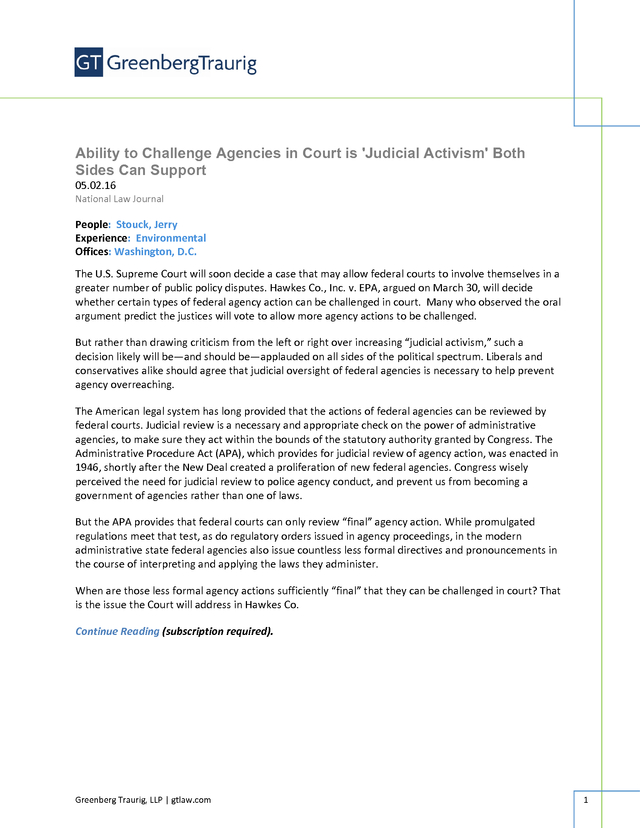Ability to Challenge Agencies in Court is 'Judicial Activism' Both Sides Can Support – May 2, 2016
Greenberg Traurig
Description
Ability to Challenge Agencies in Court is 'Judicial Activism' Both
Sides Can Support
05.02.16
National Law Journal
People: Stouck, Jerry
Experience: Environmental
Offices: Washington, D.C.
The U.S. Supreme Court will soon decide a case that may allow federal courts to involve themselves in a
greater number of public policy disputes. Hawkes Co., Inc. v.
EPA, argued on March 30, will decide whether certain types of federal agency action can be challenged in court. Many who observed the oral argument predict the justices will vote to allow more agency actions to be challenged. But rather than drawing criticism from the left or right over increasing “judicial activism,” such a decision likely will be—and should be—applauded on all sides of the political spectrum. Liberals and conservatives alike should agree that judicial oversight of federal agencies is necessary to help prevent agency overreaching. The American legal system has long provided that the actions of federal agencies can be reviewed by federal courts.
Judicial review is a necessary and appropriate check on the power of administrative agencies, to make sure they act within the bounds of the statutory authority granted by Congress. The Administrative Procedure Act (APA), which provides for judicial review of agency action, was enacted in 1946, shortly after the New Deal created a proliferation of new federal agencies. Congress wisely perceived the need for judicial review to police agency conduct, and prevent us from becoming a government of agencies rather than one of laws. But the APA provides that federal courts can only review “final” agency action.
While promulgated regulations meet that test, as do regulatory orders issued in agency proceedings, in the modern administrative state federal agencies also issue countless less formal directives and pronouncements in the course of interpreting and applying the laws they administer. When are those less formal agency actions sufficiently “final” that they can be challenged in court? That is the issue the Court will address in Hawkes Co. Continue Reading (subscription required). Greenberg Traurig, LLP | gtlaw.com 1 .
EPA, argued on March 30, will decide whether certain types of federal agency action can be challenged in court. Many who observed the oral argument predict the justices will vote to allow more agency actions to be challenged. But rather than drawing criticism from the left or right over increasing “judicial activism,” such a decision likely will be—and should be—applauded on all sides of the political spectrum. Liberals and conservatives alike should agree that judicial oversight of federal agencies is necessary to help prevent agency overreaching. The American legal system has long provided that the actions of federal agencies can be reviewed by federal courts.
Judicial review is a necessary and appropriate check on the power of administrative agencies, to make sure they act within the bounds of the statutory authority granted by Congress. The Administrative Procedure Act (APA), which provides for judicial review of agency action, was enacted in 1946, shortly after the New Deal created a proliferation of new federal agencies. Congress wisely perceived the need for judicial review to police agency conduct, and prevent us from becoming a government of agencies rather than one of laws. But the APA provides that federal courts can only review “final” agency action.
While promulgated regulations meet that test, as do regulatory orders issued in agency proceedings, in the modern administrative state federal agencies also issue countless less formal directives and pronouncements in the course of interpreting and applying the laws they administer. When are those less formal agency actions sufficiently “final” that they can be challenged in court? That is the issue the Court will address in Hawkes Co. Continue Reading (subscription required). Greenberg Traurig, LLP | gtlaw.com 1 .











